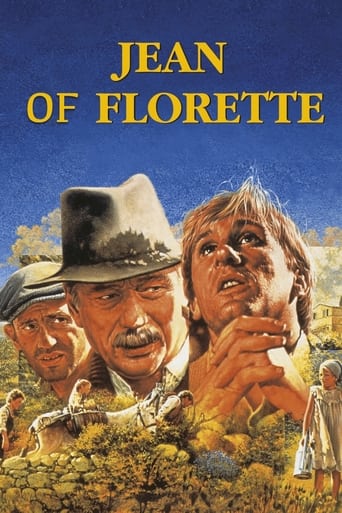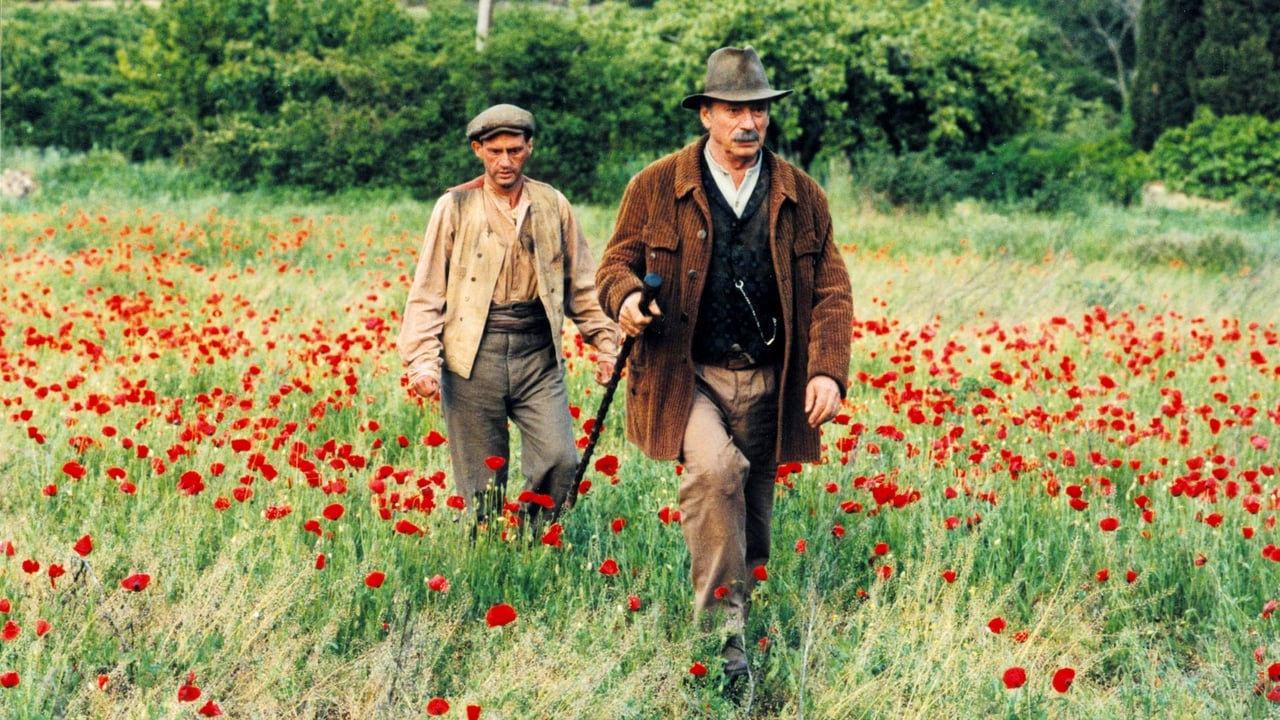TheLittleSongbird
Having been so blown away by Cyrano De Bergerac, I also watched Jean De Florette, also starring Gerard Depardieu. Jean De Florette is a very different film, but every bit as fantastic. Depardieu is very endearing in a performance that has in his career only been surpassed by Cyrano De Bergerac to me. Yves Montand and Daniel Auteuil are also outstanding as the scheming Soubeyrans. The acting is not Jean De Florette's only good asset. This is an example of a film where everything works. The story is beautifully paced and evocative, the script is witty and very cinematic, the cinematography shimmers, the scenery is breathtaking, the music is lively yet again very understated and the direction does wonderfully in capturing the pace of the seasons changing and Provence's unique atmosphere. All in all, I love this movie just as much as Cyrano De Bergerac, and I am watching Manon of the Spring(and loving it) even as we speak. 10/10 Bethany Cox
zjerunk
I have many favorites, and this is one of the crème de la crème. This is a visually stunning film more like beautiful photographic montage. It is simple, tragic story well told, unlike many of today's plots - implausibly lame, suffering on a CGI crutch for 85 minutes. The simple story is about enduring truths which have been the mainstay of the Greek classics and Shakespeare: Our human strengths, our failings, our virtues, and our vices. The story may be a fiction, but its kernel is not. It is stories and story telling like this which has kept our rapt attention for four thousand years.First we should understand that this film is only the first half the novel by Marcel Pagnol which would have been too long as a single film, and out of necessity, was shot as two. The second half is titled, Manon of the Spring. Neither film stands alone as satisfactory because, obviously, it would be incomplete, and naturally, is also important that the two halves be viewed in sequence. For a fairly dispassionate précis of the plots, I suggest reading the ones on Wikipedia, so I won't be repetitive here. I also recommend reading the boards for comments and discussions.JdF & MotS were both shot at the same time in 1986 with a budget of $17 million making it/them the biggest budget French films up to that time. JdF grossed $86M worldwide, and of that sum, only $4.9M was from the USA. MotS grossed $56M worldwide, of which only $3.9M was from the USA. In other words, culture films are not a good fit for the American viewing audience, and the gross revenue numbers bear this out. The rest of the world seems to bear out this conclusion.Foreign language films rarely do well in the USA for the simple reason that the vast majority of the viewing audience are unilingual anglophones who do not wish to burden themselves with having to work at "understanding" their entertainment - they wish to merely consume it. If it requires the work of reading subtitles or thought, it becomes unpalatable. This film requires your attention and thought!But to be fair to the US viewers, the subtitles are at times incomplete or inaccurate, and unlike the spoken word, they do not convey the emphasis or importance of certain bits of dialogue well. The plot is woven steadily throughout the film, so the viewers with no understanding at all of the French language are missing essential dialogue, and therefore plot.The bottom line is this: You will either be entranced by these two films and love them, or you will be bored by the first 15 minutes, and you'll translate that into "bad film." If your highest quality level of reading is Marvel comics then I suggest you stay away from this one.However, I recall years ago walking into a video store where this was playing on all the monitors. All the patrons in the store, ranging in age from 5 to 75 years, were standing transfixed watching this film. There was something magical about it!
johnnyboyz
Has farming, indeed agriculture in general, ever been as cinematic as it is in Claude Berri's Jean de Florette? The joy is in observing the rather articulate nuances that the characters must undertake when particular farming tasks require particular tools and items for a job at hand; the film eventually coming to resemble a tale about a man most probably as alien to farming as the audience and enjoying it as much as we enjoy watching his taking up of this challenge. The farming within the film, in its specificities revolving around the planning; the predicting; the techniques and the use of certain items and animals for certain events, is as intrinsic as the film's core study of greed and the capitalist infused garnering of an industrial item, an item which will bring large amounts of personal wealth and riches, eventually at the expense of others. The film eventually coming to form a remarkably executed, heart breakingly tragic, blackly comic, devilishly well put together period drama from France well worth checking out.The film begins with a young man named Ugolin (Auteuil) returning home to the South of France, and his uncle's farm, having served time with the French army; the soundtrack a dry and sleepy orchestral tune suggesting much in the way of travels and tiredness, only momentarily breaking off into louder bursts of a much more positive tone as he nears home. Upon arriving home, Ugolin takes clear glee in rushing to a small patch of soil on the grounds and unwrapping a plant of some kind so he may observe it; something he appears to enjoy more than being reconciled with his uncle after such a stretch of time and furthermore suggesting an inclination towards agricultural work, his dream eventually revealed to be one of which revolves around the growing and selling of flowers for a living. His uncle is Cesar (Montand), an elderly man whom demands Ugolin find a wife and have children in the near future so that the land may be passed down and kept within the family; his other eye on a stretch of land lying nearby to his own, a stretch functional enough as it stands and with a natural spring beneath it capable of escalating the quality of the goods that only Cesar knows of, but a stretch already owned by a man no way willing to just sell up.Berri spends a good deal of time with these two farmers, their dreams; their positions and their core characteristics filling up most of the film's opening act. We come to like them during this early part and their blackly funny misadventures as well as their dry observations on life and newfound situations which open up as a result of other events. We side with young Ugolin, this simple young man whom has only just returned from national service and wishes to move into floristry. It is only when the titular Jean of Florette arrives, in the form of Gérard Depardieu, that we see the true nature of them; Jean being the rightful heir to that of the land when Cesar and Ugolin accidentally-on-purpose murder the owner of the land thus bringing Jean into the equation following a string of other legal complications with the rightful land owner.Jean and his family of wife Aimee (Elisabeth Depardieu) and young daughter Manon (Mazurowna) are not used to such surroundings; their previous incarnation of living in a more urbanite locale ill preparing them for what they come into contact with here, the beauty and calmness of the locale coming to resemble mere surface featurettes as those within plot and brew. The obvious distinctions between themselves and those more attributed to the land arrive in the form of their clear differences in clothing, as well as their talk of things of a more cultured nature, namely the opera, as on occasion Aimee breaks out int chorus of song to Jean's own harmonica tunes.What unfolds is a game of cat and mouse and hope and frustration between the two farmers, in Ugolin and Cesar, and the Florettes whom hang around much to the annoyance of their neighbours whom still want the land, know of its true flourishing nature and retain the spring as their secret. Jean's gradual coming around to realise how wondrous and how magnificent the locale is, and how enthralling the individual tasks and procedures which make up farming echoes our own coming around to feel similarly towards the film. Just as agricultural activity is fresh to that of Jean, the arrival of he and his family acts as a fresh and very crisp presence within the film to that of the audience; the very gradual bringing of the audience around on Berri's behalf to have us see the two original farmers as cruel and calculating businessmen as this initial outsider and his family capture our hearts, is outstanding. The film is a really well executed drama, a wonderful piece persistently flicking from tone to tone and character to character in perfect tandem; a film working on a level of family drama, fish out of water storytelling and dark comedy culminating in something quite special.
mmunier
When Voltaire says something like " I disagree with what your saying but would die for your right to say it" I feel, in the context of these linked 2 beautiful movies that really are one, like saying I disagree with what you're saying and will shout you if you say it again" Yes after raving homage to this work there are some people who can't see anything about it, some who have only seen part one! I can't even begin to comprehend why they bother to say so. There you are i'm not a Voltairian! Once again, perhaps after 15 years I have enjoyed immensely J d F and M des sources that I consider to be only one movie in two parts and not a movie and its sequel. The first time I saw it a the cinema and was so impressed with part one that my wife and I purchased the ticket for MDS on the way out that we did not take but 2 hours later mesmerized by what we watched. My earliest knowledge of Marcel Pagnol must have been a X'mas record something like "Noel with the santons de Provence" a beautiful X'mas tale a la Pagnol (ave l'acceng du midi qui n'en fini pas) yes with the French southern accent that seems to never end! I read here a comment about inappropriate subtitles, I must admit for this movie I felt highly privileged to understand French, French rural area and French accent. Definitely these 3 ingredient give again another dimension to this work and I would believe getting the appropriate subtitle to emulate the accent would be a phenomenal task. I guess four hours can be a little taxing on some, but like many have reported it's really worth it and I can only feel sorry for the few who are or will be displeased with such a master piece.


 AD
AD




